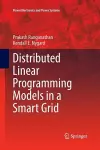
Distributed Linear Programming Models in a Smart Grid
2 authors - Paperback
£109.99
Dr. Prakash Ranganathan is Assistant Professor of Electrical Engineering at University of North Dakota (UND), Grand Forks, North Dakota, USA. He is also the Director for Secure Cyber Physical Energy Systems and Data sciences Laboratory at UND. His research interests include Linear Programming models, simulation and modeling, smart grid technologies, Optimization Methods and Software Engineering. He is an active senior member of IEEE and frequent reviewer of IEEE Transactions on Wireless Communications and Sensors Journals. Dr. Ranganathan has authored several papers on linear programming and smart grid areas. He has also secured National Science Foundation (NSF) grants and other regional grants on smart grid topics. Dr. Ranganathan holds a Ph.D. in Software Engineering, and Master of Science in Electrical Engineering from North Dakota State University, Fargo. Dr. Ranganathan received the North Dakota Spirit Faculty Achievement Award in 2013 from UND Alumni Foundation recognizing his significant contribution in teaching, research, and service. He is also a recipient of Public Scholar Award in 2014 from center for Community Engagement. Dr. Ranganathan is very active in conducting outreach activities for tribal-high school and community-college students. Dr. Ranganathan also plays leadership role on cyber educational initiatives for state of North Dakota.
Kendall E. Nygard is a full professor of computer science at North Dakota State University, Fargo, North Dakota. He earned his PhD degree at Virginia Polytechnic Institute. He has fulfilled many roles at NDSU and the North Dakota University System, including Department Chair, faculty representative on the State Board of Higher Education, and Presiding officer of the NDSU University Senate. He has advised 25 PhD students and more than 150 Master of Science students. In research, he been awarded more than 50 grants and contracts and is widely published. Application areas in which he has conducted research include the smart grid, sensor networks, unmanned air systems, wireless networks, encryption, and social media. His primary methodologies are optimization models, artificial intelligence, and big data analytics. In, 2013 and 2014 he served in Washington D. C. as a Jefferson Science Fellow and Senior Science Adviser for the U. S. Department of State and the U. S. Agency for International Development. He is currently a Virtual Fellow for the U. S. Department of State and a Fellow of the International Academy, Research, and Industry Association. Currently he is leading a Cyber Security research and education initiative for the North Dakota University System.